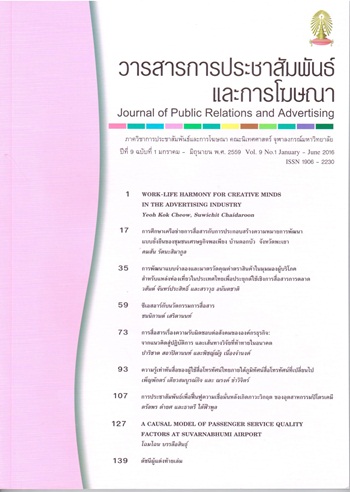A CAUSAL MODEL OF PASSENGER SERVICE QUALITY FACTORS AT SUVARNABHUMI AIRPORT
Main Article Content
Abstract
This research on a casual model of passenger service quality factors at Suvarnabhumi Airport aimed 1) to study integrated marketing communications, service quality, passenger satisfaction, and passenger loyalty, 2) to analyze both direct and indirect factors of service quality, and 3) to develop a casual model of passenger service quality management factors. The hypothesized model was based on the service quality, satisfaction, and loyalty. The results will be beneficial to airport management for planning and marketing communications. Both quantitative and qualitative methods were used. Data were collected during 2014 untill mid 2015. Firstly, in-depth interviews were conducted with the Director of Public Relations Division, the Director of Planning and Statistics Division, the Senior Officer Terminal Service, the Senior Officer Building Maintenance, the Executive Officer Suvarnabhumi Airport one stop service, the Corporate Communications Officer, and observer as participant were made at Suvarnabhumi Airport. Documents were analyzed from newspapers, related news, articles, books, and magazines. Secondly, a survey was conducted among 900 samples, selected from Suvarnabhumi Airport passengers. The respondents were over 16 years old, both Thais and foreigners, who had visited the airport at least once during 2014 untill mid 2015. Results showed that the model fitted well with the empirical data (χ2/df= 4.98 CFI = .99; RMR = .03; RMSEA = .06; GFI = 0=.95; NFI = .98; AGFI = .86). Service quality had a positive direct effect on passenger satisfaction. Integrated marketing communications had a positive direct effect on passenger satisfaction. Overall passenger satisfaction had a positive direct effect on passenger loyalty. The respondents perceived marketing communications at medium levels, with high levels for service quality, passenger satisfaction, and passenger loyalty. The findings indicated that passenger satisfaction and passenger loyalty should be significantly established focusing on service quality and integrated marketing communications.


